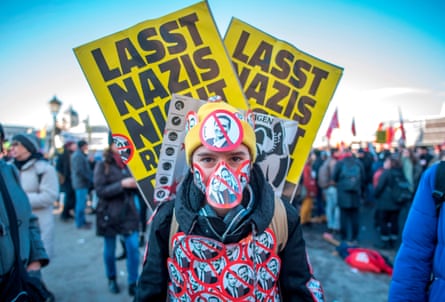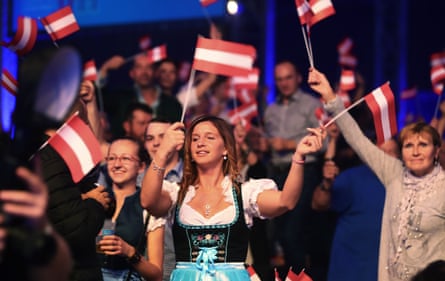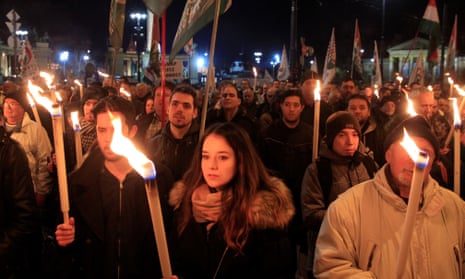In the House of Terror, one of Budapest’s most popular tourist attractions, two mannequins’ torsos stand back to back on a rotating platform, one wearing the uniform of Hungary’s communist secret police, the other that of the Arrow Cross fascist party. They bear mute testimony to the traumas of 20th-century history in this corner of Europe. Mária Schmidt, the museum’s director, says she would like to show her display to Angela Merkel, the German chancellor, thus reminding her that in 1945 Hungary was occupied by the two most brutal totalitarian regimes of the last century in the space of a single year. This would, she believes, explain why the country remains fiercely proud of its independence and suspicious of “neocolonial attitudes” towards eastern Europe from Brussels.
“We are Hungarians, and we want to preserve our culture,” Schmidt says, sitting in the museum’s boardroom. “We don’t want to copy what the Germans are doing or what the French are doing. We want to continue with our own way of life.” When the German chancellor visited Budapest in 2009, Schmidt claims she sent her an invitation to a commemorative event but got no response. “There is only one explanation for this,” she says. “She has a heart of ice.”
A historian who once wrote acclaimed books about the Holocaust, Schmidt is now seen in Hungary as intellectual-in-chief to the country’s avowedly illiberal prime minister Viktor Orbán, whose government subsidises the museum and a number of think tanks directed by her.
Like Orbán, she is no fan of refugees. Schmidt rejects the term for the thousands of people from Syria, Afghanistan and other war-torn countries who were left stranded at Budapest’s Keleti station in the summer of 2015, insisting they were “migrants” because they had already crossed several borders on their journey to the heart of the continent.
“We used to fight Turkish invaders and were occupied by the Turks for 150 years,” she says. “We know the consequences that certain kinds of contacts may entail.”
Schmidt dismisses the argument that European economies need immigration to make up for declining demographics and, in Hungary’s case, high levels of emigration: “The Hungarians who have emigrated will eventually come back because they will realise it is better here than anywhere else,” she says, adding that “automation and artificial intelligence are creating new kinds of methods of production” that require a smaller labour force.
“There is a debate about the future of Europe: whether it can remain an alliance of nation states, or whether it should become an empire. I don’t believe in empires. Where is the Soviet Union now? Where is the Third Reich? Where is the Ottoman empire? Where is the British Empire? Meanwhile, Hungary is still here. This is a state which is 1,100 years old.”

“Germany, by comparison, is a young country,” Schmidt adds, raising her voice. “I don’t like being lectured by people who couldn’t even set up a nation state before 1871.” Schmidt’s office later emailed to clarify that she had intended this as a joke.
Increasingly, there are signs that Schmidt and Orbán have the ambition to take their brand of “illiberal democracy”, with its constant attacks on liberal freedoms and its disdain for Muslim migrants perceived to be undermining the country’s Christian identity, to another level.
“Twenty-seven years ago here in central Europe we believed that Europe was our future; today we feel that we are the future of Europe,” the Hungarian prime minister told an audience in Romania last July, sketching out a scenario whereby Hungary would no longer just obstruct Brussels but begin to shape the continent in its image.
And as the fallout from the 2015 refugee crisis continues to divide east and west Europe, Orbán gathers copycats and admirers across the former Soviet bloc.
Since Poland’s 2015 general election the conservative Law and Justice party (PiS) has found itself entrenched in a constant stand-off with EU leaders over its plans to overhaul its constitutional court – a battle similar to one fought in Hungary in 2013.
As with Orbán’s assault on the judiciary, human rights NGOs and press freedom, Polish cities have seen large-scale protests by a younger generation, with thousands of people taking to the streets to protest against restrictions on women’s rights in the spring of 2016.
In the Czech Republic, president Miloš Zeman managed to secure his re-election last weekend by running a campaign from the Orbán playbook, painting his liberal opponent Jiří Drahoš as a pro-immigrant elitist with ties to Merkel.
Even Austria, governed since December by a right-leaning coalition which includes Heinz-Christian Strache’s rightwing Freedom Party (FPÖ), has not been immune to the Hungarian leader’s populist charm.
Orbán, who expects to extend his rule at elections in April, last Tuesday boarded a humble Railjet train to meet the new Austrian prime minister, Sebastian Kurz, in Vienna and declared a “fresh start” in Austrian-Hungarian relations: a symbolic westward extension of the Visegrád group – the post-cold war alliance formed in the early 1990s between Poland, Hungary, Slovakia and the Czech Republic – with a dash of old Habsburg glamour.

This November marks the centenary of the collapse of the Habsburg empire, ruled for the last stretch of its 650 years by a dual monarchy from Budapest and Vienna. For Ivan Krastev, a Bulgarian political scientist at Vienna’s Institute of Human Sciences, the anniversary is crucial for understanding the new anti-Brussels axis running through the continent.
“In central and eastern Europe, the disintegration of the Habsburg empire resulted in the emergence of interwar ethnic states,” he says. “But these states were highly unstable because of the rivalries built up before the war.” Eastern European resentment over the refugee crisis had thrived because many states in the region still associate ethnic diversity with the tumultuous years between the wars.
In his 2017 book After Europe, Krastev sketches out how the genocides and migration waves of the war years replaced a previously multicultural Austrian-Hungarian empire, where parliaments at times allowed delegates to speak in any of eight languages, with a region of ethnically homogenous nation states.
Eventually, some of them signed up to the philosophy that states should be founded on a homogenous culture, a 19th-century western idea. Now that Germany had suddenly changed its mind about multiculturalism in the 21st century, why should they follow suit again?
If the story of the Austro-Hungarian empire and its collapse can explain the deeper dynamics of the new rift between eastern and western Europe, it also hints at where Orbán’s conservative counter-revolution may come up against its limits.
“There is a widespread view in central and eastern Europe that multinational empires were fated to collapse, because the western powers and historians spent decades telling them that they were,” says Philipp Ther, a professor of central European history at Vienna university and author of the prizewinning Europe Since 1989: A History. “In fact, in Austro-Hungary’s case, it was full of life and managed to gradually democratise, a lot more so than Prussia.
“But there won’t be a revival of Austro-Hungary now,” Ther says. “On the contrary: we will see growing conflicts between Austria and Hungary in the coming years.”
Austria’s vice chancellor Strache may have argued the case for Austria joining the Visegrád group in last year’s election campaign. But his own Freedom Party has been just as vocal about the need to hinder eastern European migrants’ access to the Austrian welfare state: plans to index benefits for children of Hungarian migrant workers is one of his government’s signature policies. Eastern European governments, including Orbán’s, have announced their intention to oppose the measures – in Brussels, naturally.
Austria, meanwhile, has announced its intention to sue Hungary for plans to expand a nuclear power station near the Austrian border, which is financed with a Russian loan of over €1bn.

The Visegrád group, a loose network without any joint institutions or binding agreements, was partly set up as a post-imperial project from which the old power player in the region, Vienna, was deliberately excluded. The Austrian right, meanwhile, is less keen on seeing Poland as part of an eastern alliance, because it would no longer be the biggest and most powerful player.
Stoking nationalist sentiments has helped Orbán win elections but could eventually back his country into a demographic dead end. The economies of Poland and the Czech Republic already draw vast numbers of guest workers from the Ukraine. Hungary, on the other hand, speaks a complex language that has more in common with Finnish and Estonian than the Slavic tongues of its neighbouring states, and offers wages which are unattractive even to Hungarian minorities in Slovakia.
“Orbán doesn’t have the intellectual potential to become a leadership figure for the post-American European right,” argues Ther. “His notion of ‘illiberal democracy’ is a phrase, but not a concept with real foundation.”
Zeman’s courting of trade with China and Russia has drawn ire from Brussels and Berlin, but there are also western economists who concede that eastern European states may have to rebalance their economic models to avoid being stuck in what some call the “Europeanisation trap”. In a recent post for his blog at Le Monde, economist Thomas Piketty argued that the returns western investors have drawn from the Visegrád Four more than exceed capital flows heading the other way.
Yet, for now, Germany remains by far the most important export and import partner for each of the four Visegrád countries and Austria. Any move toward political divergence finds itself up against years of economic convergence.
“Nationalism used to be about your army or your economy,” says Krastev. “Now it is very much about the politics of culture, which is why people like Mária Schmidt are so important to Viktor Orbán.”
But the culture wars that galvanise support for Orbán in Hungary do not automatically work in Poland or Slovakia. In January the Hungarian foreign office abruptly cancelled a Future of Europe conference it had organised to mark the country’s presidency of the Visegrád Four. Schmidt says the conference had been postponed until May because it been caught “in the cross-hairs of political attacks” ahead of the April election. But some speculate that the conference was called off because the list of invited speakers, including alt-right provocateur Milo Yiannopoulos, proved too unpalatable for some of the other co-hosting governments.
As pessimistic as Krastev is about the future of the European Union, he is even more sceptical about Orbán’s conservative counter-revolution. “In a strange way, the success of every revolution is legitimised by the counter-revolution. I don’t believe we can restore nation states. And, at any rate, such nation states have a very short history. We are trying to make normal something that was very unusual.”
After a pause, he adds: “Of course, the problem is that the fact that no one really wants to destroy the European Union isn’t a guarantee that it isn’t going to disintegrate. Disintegration of empires is rarely an intention – it’s usually a traffic accident. Empires tend to disintegrate from the centre, not from the periphery.
“If Hungary were to leave the EU, no one would notice. The problem with the European Union comes when Germany decides it no longer has the patience to deal with this mess.”
MITTELEUROPA TURNS RIGHT
Austria
Chancellor Sebastian Kurz of the centre-right Austrian People’s Party rules in a coalition government with the far-right Freedom Party. The parties have stated their intention to curb benefits for migrants from other EU member states and restrict cash payments for asylum seekers. While explicitly ruling out a referendum on EU membership, Kurz said the European Union should focus more on “big issues” and not “small issues on which nations or regions can better decide for themselves”. Receiving Viktor Orbán in Vienna this week, Kurz stated his aim to become “a bridge-builder between the Visegrád states and the countries in western Europe”
Czech Republic
President Miloš Zeman, one of the last remaining active leaders from the region’s post-Soviet transition period, last weekend managed to get reelected by beating an opponent he derided as a pro-immigrant elitist with ties to Angela Merkel. Zeman surrounds himself with business advisers with connections to Moscow and Beijing and opposes sanctions against Russia. Prime minister Andrej Babiš hails from rightwing populist party ANO but advocates close economic ties with the European Union.
Hungary
Campaigning is underway for a national poll on 8 April that is expected to result in the reelection of prime minister Viktor Orbán of Fidesz. Hungary’s government has clashed with Brussels over its opposition to distribution quotas for refugees and judicial reforms that critics have described as “a serious risk to the rule of law”. A new law, dubbed the “Stop Soros Plan”, looks designed to curb the influence of Hungarian-born financier George Soros, who founded the Central European University and donates to the Hungarian Helsinki Committee, a human-rights group.
Poland
Poland has been engaged in a two-year legal battle with Brussels that has been prolonger rather than curtailed by a government reshuffle and the appointment of a new PM, Mateusz Morawiecki. The Polish government has been battling to control the constitutional court, a move which critics say puts the country on a road to autocracy. On Thursday, the Polish government passed a libel bill that allows jail sentences for those accusing the Polish population of collaborating in the Holocaust or other war crimes.
Slovakia
Slovak prime minister Roberto Fico has his own history of clashing with the rest of the EU, describing the bloc’s migration policy in January 2016 as “ritual suicide”. But Slovakia is also the Visegrád group’s only member of the eurozone, and Fico last October insisted that ties with western Europe were more important for his country than solidarity with its Eastern European neighbours, describing his country as “a pro-European island in this region”.
